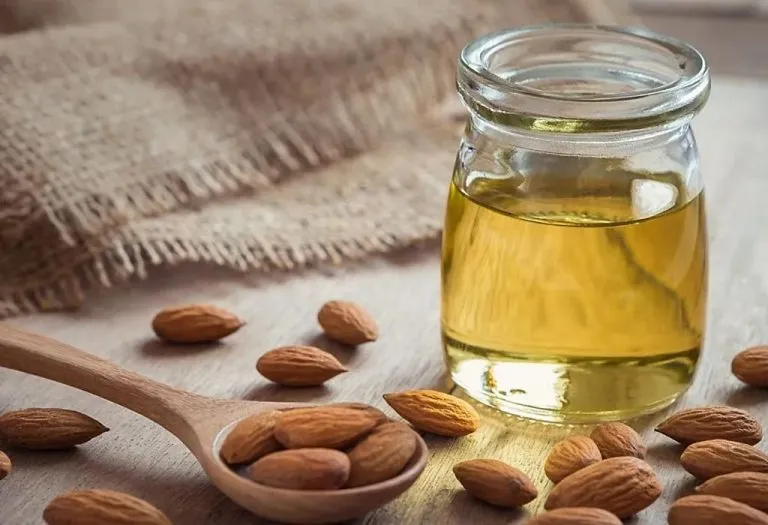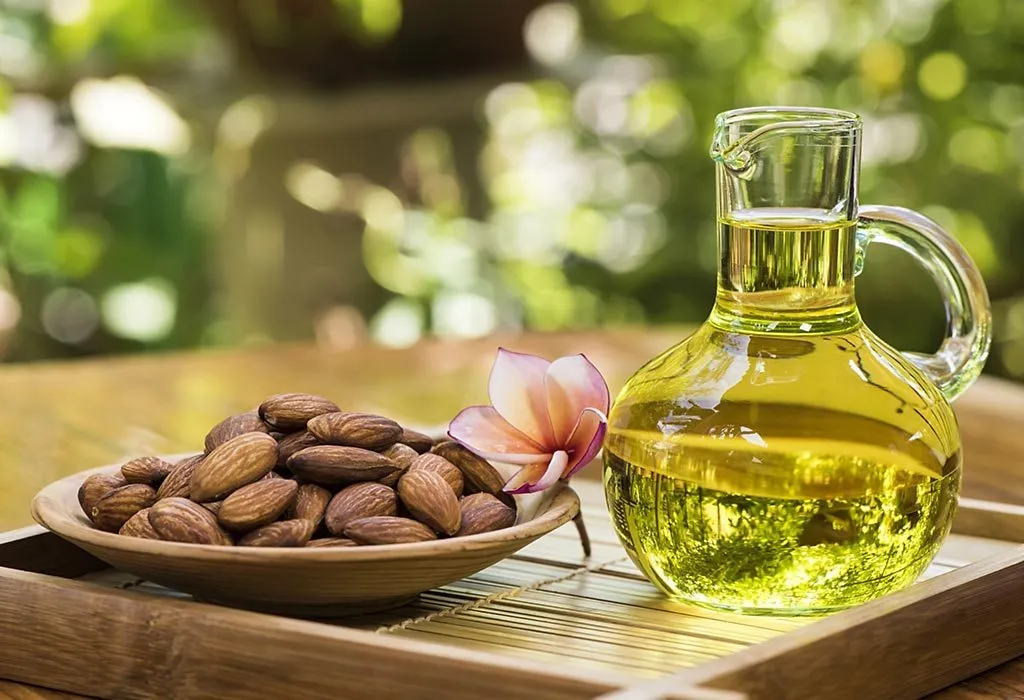Using Almond Oil During Pregnancy – Is It Safe?

We end up evaluating every food and skincare product a second time around when pregnant. Some substances like alcohol and some pharmaceutical drugs immediately become no-nos. Other substances, such as essential oils and herbs, such as lemongrass, fall somewhere in the middle – to be used with caution, sparingly, or moderately. If you’ve been using almond oil for years now, you’re likely to wonder about the safety of using almond oil during pregnancy. Let’s find out if you can continue to use almond oil in pregnancy or not!
Can Pregnant Women Use Almond Oil?
Let’s get to the question straight, ‘Is almond oil safe for pregnancy?’ Yes, pregnant women can use almond oil during pregnancy it being an ideal emollient and moisturiser (1). Three types of almond oils are commonly found in the market. We will look at the use and safety of all of these:
1. Sweet Almond Oil
Sweet almond oil has been used by pregnant women both for consumption and for external use, as moisturising oil for centuries. It is a ‘carrier’ oil – it is usually used in large quantities (as opposed to ‘essential’ oils). In common parlance and throughout this article, when ‘almond oil’ is mentioned, it refers to sweet almond oil.
2. Bitter Almond Oil
Bitter almonds are fruits (almonds are fruits, not nuts!) of a separate breed of the almond tree from sweet almonds. Bitter almond oil is an essential oil, and it is moderately toxic to ingest. National Eczema Association advises not to ingest or apply topically on the skin (2).
3. Roasted Almond Oil
Roasted almond oil is made of sweet almonds. It is used for cooking purposes only. The roasting is done to ensure a hint of nutty almond flavour to the oil. This flavour is mild or absent if no roasting was done prior to crushing for oil.
Benefits of Almond Oil During Pregnancy
Almond oil and pregnancy go hand in hand. The nutrition in sweet almond oil makes it beneficial for heart health, controlling diabetes and colon health, and providing antioxidants for your body.
However, during pregnancy, the benefits of the external application of almond oil make it so widely popular.
1. Stretch Marks Prevention
Stretch marks appear when the body is expanding faster than the skin can regenerate to accommodate for the fast growth. Almond oil moisturises skin and increases flexibility and suppleness. The daily application of this oil or cream enriched with the oil over the stomach, thighs, breasts, and other parts of the body that are prone to developing stretch marks can help reduce and prevent further appearance (3).
2. Dealing With Dry Skin
Circulation of blood to extremities such as hands and feet could reduce during pregnancy due to the heavy demands on the body. This causes dry skin in the hands and feet. Sweet almond oil is easily available and can be used in place of expensive moisturising creams. It is one of the safest moisturising oils for external use during pregnancy. Additionally, moisturising creams containing sweet almond oil are helpful in treating hand dermatitis (4).
3. Treatment for Perineal Area
The perineal area is the area between the vagina and the anus. Perineal skin is prone to tearing during childbirth. Massaging your perineal skin with almond oil for five minutes daily, preferably after 34 weeks of pregnancy, can help make the skin supple enough to withstand the pressure of childbirth.
How Is Sweet Almond Oil Different From Natural Almond Oil?
Since almonds are rarely sold with the description of ‘sweet’ almonds or ‘bitter’ almonds, there is a lot of confusion among consumers as to what the differences between the two types are. They are both naturally found. However, natural almond oil, a.k.a bitter almond oil, is different from sweet almond oil. First, understand the difference between sweet almonds and bitter almonds to actually learn how sweet almond oil is different from natural almond oil.
1. Source
Sweet and bitter almonds come from two different varieties of the almond tree. The sweet almond tree produces white flowers, while the bitter almond tree produces pink flowers.
2. Edibility
Bitter almonds contain traces of cyanide and other toxic compounds, making them inedible. Sweet almonds, on the other hand, are famed for their health benefits.
3. Appearance
Bitter almonds are slightly broader and shorter than sweet almonds. However, both surfaces are similar, and it would be difficult to distinguish one without another type for reference.
Let’s See the Difference Between Sweet Almond Oil and Bitter Almond Oil
Sweet almond oil lubricates and revitalises skin. It is a light oil and is absorbed quickly by the skin, making the use of sweet almond oil in the form of creams and moisturisers for stretch marks during pregnancy famous worldwide (3).
Bitter almond oil is an ‘essential’ oil. It has a pleasant aroma but no health benefits. It should only be used in its processed form, where all the harmful compounds have been removed. Another indication is that bitter almond oil can only help reduce stretch marks during pregnancy when massaged for about 15 minutes along with the application. Otherwise, a simple application will have no effect on the marks (5).
Precautions to Take While Using Almond Oil When Pregnant
Follow these precautions if you wish to use almond oil when pregnant:
- If the use of almond oil causes itchiness, stop immediately.
- Be careful when using almond oil in conjunction with other supplements or medications. The oil and the supplements may interact and cause harm to your body. Always consult your doctor about before adding supplements or medicine.
- Almond oil is a mild-acting laxative. Ingesting it in the later stages of pregnancy could induce uterine wall contractions, so avoid it.
- Do not use almond oil if you are allergic to it.
Does Using Almond Oil During Pregnancy Cause Preterm Birth?
The area of study on what foods may or may not be safe for pregnant women is quite lacking in information as it would be unethical to induce pregnant women to adopt lifestyle choices that may endanger their foetus.
A study conducted in Italy, where 700 mothers were interviewed on their use of herbal supplements during pregnancy, concluded that the regular application of almond oil on the skin might increase the chances of preterm birth (6).
A large percentage of the women were noted to have been taking herbal supplements during their pregnancy. While there was a definite correlation between the spreading of almond oil on the stomach and the chances of preterm birth, the amount of data was not considered adequate for a definite conclusion.
Always consult your doctor before adding any herbal supplements to your nutrition or skincare during pregnancy. With the lack of data, we cannot be sure about the results of almond oil interacting with other herbal supplements. There is plenty of anecdotal evidence of the use of almond oil during pregnancy, but only positive results have been found. Hence, much more research data is required before facts can be established.
FAQs
1. What is the recommended limit for the per-day dosage of almond oil for safe use during pregnancy?
No particular limit is decided on the recommended dosage of almond oil for expecting women. Therefore, before using the oil, please consult your doctor.
2. Can I use almond oil for body massage during pregnancy?
Almond oil is a nourishing oil for dehydrated skin and can be used for massaging into the skin to help relieve any pregnancy-related pain. However, there is no evidence of it relieving aches and pains during pregnancy.
3. Can people of all skin types use almond oil?
Yes, almond oil is an ideal oil for dehydrated skin. It is helpful for all types of skin if used in moderation.
4. I’m not able to access almond oil. Are there alternatives that serve the same purpose?
You can try coconut oil, cocoa butter, aloe vera, or olive oil to deal with pregnancy-related stretch marks. Please remember, there is no written evidence claiming these oils reduce or treat stretch marks (7).
Disclaimer: The information given in this article is not intended or implied to be a substitute for professional medical advice, diagnosis, or treatment. We urge readers to seek the advice of a physician before using almond oil or any other herbal supplements during pregnancy.
References/Resources:
1. Chularojanamontri L, Tuchinda P, Kulthanan K, Pongparit K. Moisturizers for Acne: What are their Constituents? J Clin Aesthet Dermatol.; PubMed Central; https://www.ncbi.nlm.nih.gov/pmc/articles/PMC4025519/; May 2014
2. Get the Facts: Almond Oil; National Eczema Association; https://nationaleczema.org/blog/get-the-facts-almond-oil/
3. Hajhashemi. M, Rafieian. M, et al.; The effect of Aloe vera gel and sweet almond oil on striae gravidarum in nulliparous women; The Journal of Maternal-Fetal & Neonatal Medicine; Taylor & Francis Online; https://www.tandfonline.com/doi/full/10.1080/14767058.2017.1325865?scroll=top&needAccess=true; May 2017
4. Zeichner. J. A, Berson. D, et al; The Use of an Over-the-Counter Hand Cream With Sweet Almond Oil for the Treatment of Hand Dermatitis; JDD; https://my.clevelandclinic.org/health/diseases/10785-stretch-marks; January 2018
5. Timur Taşhan. S, Kafkasli. A; The effect of bitter almond oil and massaging on striae gravidarum in primiparaous women; J Clin Nurs.; PubMed; https://pubmed.ncbi.nlm.nih.gov/22594386/; June 2012
6. Facchinetti. F, Pedrielli. G, et al.; Herbal supplements in pregnancy: unexpected results from a multicentre study; Human Reproduction; Oxford Academic; https://academic.oup.com/humrep/article/27/11/3161/811869?login=false; November 2012
7. Stretch Marks, Cleveland Clinic; https://my.clevelandclinic.org/health/diseases/10785-stretch-marks
Also Read:
Using Lavender in Pregnancy
Tea Tree Oil when Pregnant
Using Eucalyptus Oil during Pregnancy
Using Castor Oil while Pregnant for Labor Induction
Was This Article Helpful?
Parenting is a huge responsibility, for you as a caregiver, but also for us as a parenting content platform. We understand that and take our responsibility of creating credible content seriously. FirstCry Parenting articles are written and published only after extensive research using factually sound references to deliver quality content that is accurate, validated by experts, and completely reliable. To understand how we go about creating content that is credible, read our editorial policy here.





































